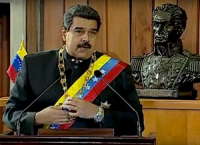-
Twitter Takes Down Louis Farrakhan’s 2018 Anti-Semitic Tweet after Policy Change
Twitter said Tuesday that it was requiring anti-Semitic hate preacher and Nation of Islam leader Louis Farrakhan to delete a 2018 anti-Semitic tweet that compared Jews to termites. The move came as the social media giant introduced new rules prohibiting “language that dehumanizes others on the basis of religion.”
-
-
YouTube removes audio copies of neo-Nazi books
James Mason’s neo-Nazi manifesto, Siege, has inspired a generation of neo-Nazis since it was first published as a single volume in 1992. The book sparked a violent online subculture called Siege Culture, devoted to Mason’s calls for independent terror cells to carry out a race war. YouTube has now taken down uploads of both Siege and the neo-Nazi book The Turner Diaries.
-
-
Former Heads of DHS and NSA Explain How the U.S. Can Keep Huawei at Bay
On Wednesday, the FCC opened additional mid-band spectrum to support 5G mobile communications in the U.S., reducing reliance on short-range microwave spectrum that comes with high deployment costs. This move will help to ensure the U.S. doesn’t fall further behind other countries in the adoption of 5G, which is expected to spark $12 trillion in new economic activity by 2035, especially in enabling the internet of things.
-
-
In El Paso Court, Migrants No Longer Get Legal Advocates or Pre-hearing Briefings on Their Rights
El Paso’s backlogged immigration court recently halted programs designed to aid asylum seekers as they navigate a complicated legal system. “The confusion in the courtroom is palpable,” says one advocate.
-
-
Once Again, Russian Internet Propaganda Efforts Shown to Be Much Bigger than Originally Believed
Early on, as the scope of Russia’s disinformation and hacking efforts were being revealed, there was a tendency on many fronts to downplay the depth and breadth of the problem, with many describing the Russian effort as a few harmless sods posting lame memes in broken English. In time, it became clear that the efforts were larger, broader, and far more sophisticated than initially believed.
-
-
A New Idea for Fighting Chinese Theft of American Defense Technology
China is engaged in an organized effort to mass-produce counterfeit goods for resale abroad. This counterfeiting and copyright and trademark infringement harms America’s business owners, consumers, inventors, investors, and workers. China’s campaign of theft simultaneously seeks to obtain U.S. military technology to gain a decisive material advantage in a future armed conflict.
-
-
Israel help thwart 50 terror attacks in 20 countries
Israel’s intelligence services helped prevent 50 terrorist attacks in 20 countries in the last three years, it was revealed last night. A report by Israel’s Channel 12 News said that the Mossad and Israeli Military Intelligence had helped prevent fifty terrorist attacks by providing foreign governments and their intelligence agencies with information that an attack was being planned either by ISIS or Iranian sponsored groups in their countries.
-
-
The State of the Deal: How the Numbers on Iran's Nuclear Program Stack up
When it comes to the state of the Iran nuclear deal, there are enough figures flying around to make your head spin like atoms in a first-generation gas centrifuge. Here’s a little guide to help you keep track of the score.
-
-
The Great Replacement, White Genocide Theories: Prevalence, Scale, Proliferation
A new in-depth study of the Great Replacement and White Genocide, two racist conspiracy theories with hundreds of thousand followers – some of them violent — in Europe and the United States, has found that the proliferation of theses conspiracy theories was helped by their mainstreaming by elected officials, and the active promotion by alternative far-right media outlets.
-
-
Italy’s Risky Realignment
The Kremlin actively helped two Italian populist parties – The League and the Five Star movement – to reach power in Rome. The goal: Weaken the West and undermine the U.S.-created post-WWII international order. The Italian government is now repaying its supporters, formally endorsing China’s Belt and Road Initiative (BRI), which is meant to anchor an increasingly proselytizing authoritarian regime as the center of the global economy. Italy is thus helping the world’s most powerful authoritarian state establish a beachhead in southern Europe, threatening European strategic sectors, and publicly distancing itself from the EU’s efforts to respond to a “systemic rival.”
-
-
Europe Built a System to Fight Russian Meddling. It’s Struggling.
The European Union launched an ambitious effort earlier this year to combat election interference: an early-warning system that would sound alarms about Russian propaganda. Despite high expectations, however, records show that the system has become a repository for a mishmash of information, produced no alerts and is already at risk of becoming defunct.
-
-
Venezuelan government's death squads kill thousands: UN

A UN report published Thursday has detailed the extrajudicial executions of thousands of young men by the special forces of the government of Nicolas Maduro in Venezuela. The report offers evidence that that the Venezuelan government’s death squads are carrying out Maduro’s broad strategy for neutralizing the opposition to his regime and eliminating political opponents.
-
-
IAEA confirms Iran enriching uranium in excess of 2015 nuclear deal limit

The United Nations atomic watchdog agency has confirmed that Iran has surpassed the limits on how much it was allowed to enrich uranium under the 2015 international nuclear deal. The International Atomic Energy Agency said its inspectors verified Monday that Iran has passed 4.5 percent enrichment, breaching the 3.67 percent limit set in the accord aimed at restraining Tehran’s nuclear weapons development.
-
-
U.S. Designates Chief of Hezbollah’s Intelligence Unit as a “Global Terrorist”
The United States announced last Tuesday that it has identified Husain Ali Hazzima, a senior Hezbollah operative, as a Specially Designated Global Terrorist (SDGT). Meanwhile, a new intelligence assessment released by the German state of North Rhine-Westphalia revealed on Thursday that the number of Hezbollah operatives in Germany rose in 2018.
-
-
Huawei CVs Show Close Links with Military, Study Says
A study of the employment information of thousands of Huawei staff has revealed deeper links with the Chinese military and intelligence apparatus than those previously acknowledged by China’s biggest telecom equipment maker. The findings are likely to add fuel to the debate among governments around the world over whether to block Huawei’s gear from the rollout of 5G telecoms networks for security reasons.
-
More headlines
The long view
Factories First: Winning the Drone War Before It Starts
Wars are won by factories before they are won on the battlefield,Martin C. Feldmann writes, noting that the United States lacks the manufacturing depth for the coming drone age. Rectifying this situation “will take far more than procurement tweaks,” Feldmann writes. “It demands a national-level, wartime-scale industrial mobilization.”
No Nation Is an Island: The Dangers of Modern U.S. Isolationism
The resurgence of isolationist sentiment in American politics is understandable but misguided. While the desire to refocus on domestic renewal is justified, retreating from the world will not bring the security, prosperity, or sovereignty that its proponents promise. On the contrary, it invites instability, diminishes U.S. influence, and erodes the democratic order the U.S. helped forge.
Fragmented by Design: USAID’s Dismantling and the Future of American Foreign Aid
The Trump administration launched an aggressive restructuring of U.S. foreign aid, effectively dismantling the United States Agency for International Development (USAID). The humanitarian and geopolitical fallout of the demise of USAID includes shuttered clinics, destroyed food aid, and China’s growing influence in the global south. This new era of American soft power will determine how, and whether, the U.S. continues to lead in global development.
Water Wars: A Historic Agreement Between Mexico and US Is Ramping Up Border Tension
As climate change drives rising temperatures and changes in rainfall, Mexico and the US are in the middle of a conflict over water, putting an additional strain on their relationship. Partly due to constant droughts, Mexico has struggled to maintain its water deliveries for much of the last 25 years, deliveries to which it is obligated by a 1944 water-sharing agreement between the two countries.
How Disastrous Was the Trump-Putin Meeting?
In Alaska, Trump got played by Putin. Therefore, Steven Pifer writes, the European leaders and Zelensky have to “diplomatically offer suggestions to walk Trump back from a position that he does not appear to understand would be bad for Ukraine, bad for Europe, and bad for American interests. And they have to do so without setting off an explosion that could disrupt U.S.-Ukrainian and U.S.-European relations—all to the delight of Putin and the Kremlin.”
How Male Grievance Fuels Radicalization and Extremist Violence
Social extremism is evolving in reach and form. While traditional racial supremacy ideologies remain, contemporary movements are now often fueled by something more personal and emotionally resonant: male grievance.
